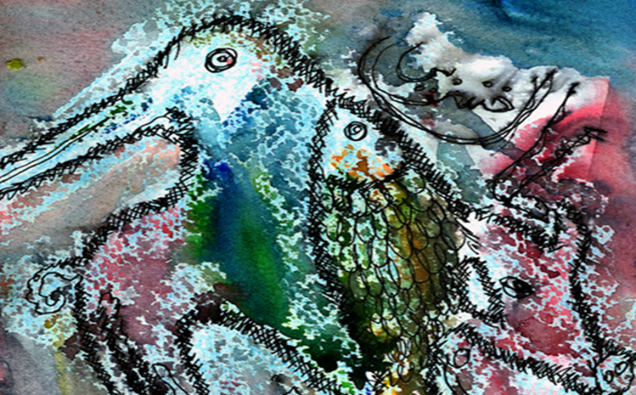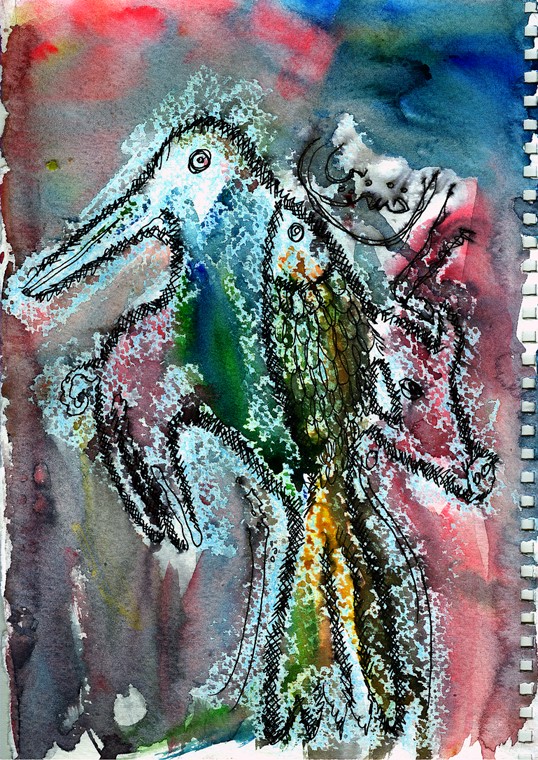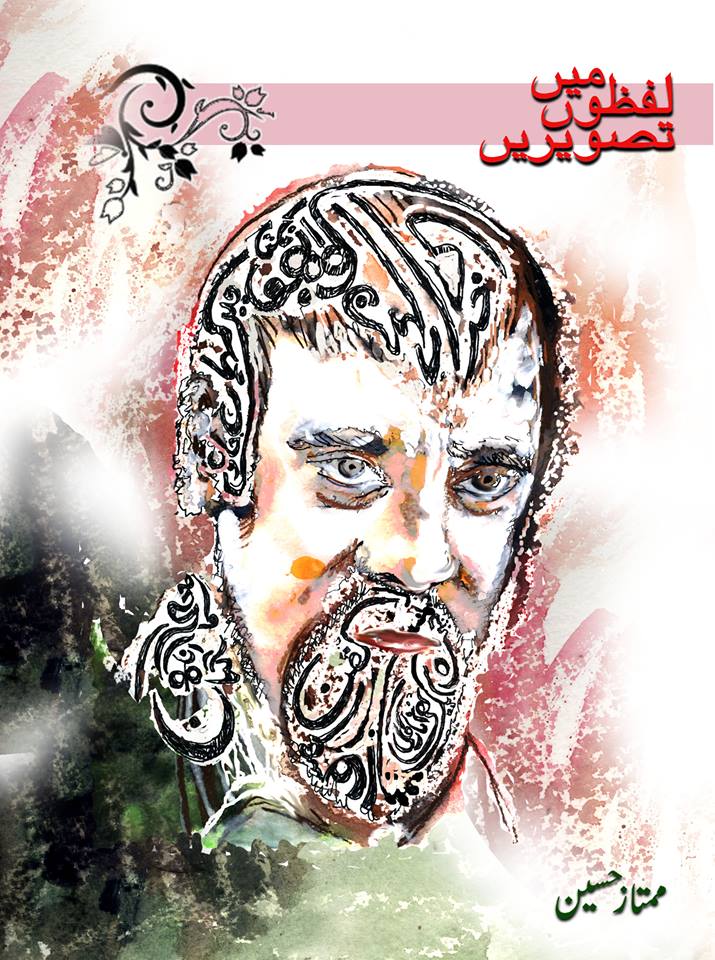
I was dying of thirst and rain had been banished from the skies. The clouds were intoxicated elephants waving their trunks at me, their shapes transforming into a vortex of steam. I longed to ascend and enter them to quench my thirst, but when I opened my elongated beak and penetrated a gigantic black cloud, utter darkness engulfed me. I found myself flying in a dry ocean of sky but determined to proceed to the ground and fulfill my fate, I shriveled my wings, wrapping them around my body, and took a downward plunge. Whereupon I saw dense smoke rising from a mud house behind a grove of trees.
My beak burst with joy, clacking as if a wedding ceremony had just ended. I shifted my torso, looking left and right, and flew toward the smoking mud house, where kofta curry and rice biryani cooked over large outdoor fires. There, a portly chef ladled water into a giant bucket. I spread my wings and stretched my legs, planning to grab hold of the bucket with my claws.
“Hey, you uninvited clown!” the chef bellowed, throwing his shoe at my face. The shoe flew over my beak with a loud zoon. “The circumcision ceremony is a half-day away. You’re here too early with your silly kayn kayn sounds.”
Suddenly a boy yelled, “Look at that white crow!” Standing in a circle of boys, he loaded a pebble into his slingshot. A white crow had never before been seen in this part of Pakistan.
I told myself that life is a more precious drink, that I had better try my luck elsewhere, and escaped just as the pebble approached my skull. In another flash, I opened my half-dead eyes and stood in a cattle barn with an abandoned pitcher of water at my feet. I put my thirst-stricken lips to the rim of pitcher, delighted that I might drink a few days’ quotas of water in one quick gulp. I spread my wings once more, extended my legs, and braced the pitcher with my claws, assessing the risks on all sides and thanking god that the only threat in view was a buffalo lashing its tail from side to side. I extended my neck, then passed through the mouth of the pitcher and reached into its belly. I couldn’t touch water, so I pulled my neck out and angled my head to peek inside with just one eye. Sparkling water refracted sunlight.
I put some pressure on my brain. What should I do? Make use of my intelligence? Apply scientific formulas? Glancing around, I remembered the boy who’d loaded a pebble into his slingshot. His image took hold of me—I don’t know why—and my neck began jerking—pebble, pebble, pebble. A pebble could be both a threat and my savior! If I dropped a pebble into the pitcher, the water level would rise. My thirst might finally be quenched.
Excitement pulsed through my bird body. I wanted to hop like a penguin in a black suit and tie. I peered around the barn again, my hopes and desire driving me, but instead of pebbles, I found clay. Oh dear, that would soak up my water rather than raise the surface. I needed solid rocks.
I flew toward the sky, whereupon a gust of wind threw me god knows where, and I awoke in a beautiful town in which enormous white stone columns floated alongside a marble staircase that led to a white granite throne. The glorious god Zeus sat on the throne in splendid pomp and show. Thin white and blue curtains draped around the columns and quivered in the breeze, and a harp made of turtle bones produced a melodious song. It was such a beautiful, white supernatural town. I longed to be part of it, to spend the rest of my life there, eating crumbs from the hands of children and entertaining my relatives. In this heavenly world of white, I could blend so well that even the most beautiful peacock would feel inferior.
The god Zeus glanced down at me. “You will shine like the sun in my kingdom!” he declared. “You will alert us to threatening weather and storms. You will inform us of any approaching bad luck. I grant that you will learn the secrets of the visible and invisible world.”
Joy enveloped me, and gratitude fortified my soul—I was to be Zeus’s messenger!—but the next day Apollo summoned me to his chambers and announced that his cows were missing.
“You, white crow with the high qualities!” he intoned. “Zeus asks, ‘Where is my herd?’”
I shriveled in fear, bowed my head, and took a deep breath. “Oh, god, Apollo, if you promise me safety, I will tell the truth—but I have big news, and my beak is small.”
When at last Apollo promised to protect my life, I told him, “It was the twelfth god of Olympus who spirited your herd away.”
Apollo flew into a rage. Fire blazed from his mouth and smoke blew out his ears. “You lying bird! There are only eleven gods of Olympus, there is no twelfth!” He went on, “I will teach you a lesson you will remember until Doomsday. I would wipe you off the face of the earth had I not promised you safety!”
My body began to transform. My white beak and wings turned black. I said to myself, I want to move out of this world and escape this is war of gods. Why are they punishing me? Why am I the victim of Apollo’s anger?
And at that moment I spotted a pebble near a large marble column. I secured it in my beak and bent my tail to chant a song:
Crow, Oh Crow,
You reign to reign
In thisimperfect universe
In crippled time…
You are the keeper of mysteries,
Hoarding the filth of the world in your wings.
Swim, float, fly through this sky to the skies beyond you,
Holding the scene in your claws
As you pass through this heaven to another.
One day you are in the court of Zeus.
You dissolve into each world, the black and white portrait…
One day you witness the murder of Habeel.
One day you journey across the killing-field of Karo Kashatar.
In your eyes, you carry combat, holy waltzes, to future epochs.
Thirst in your beak, hope in your eyes and on your tongue,
You recite the epic of many lives.
You are the chronicler of history,
The messenger of mystery…
But in the landscape of my life,
Don’t you have anything but stones to throw?
Crow, Oh Crow!
I fled the heavens and returned to earth—to the barn and water pitcher—and threw my pebble into depths. I angled my neck to see into pitcher and strained to touch the water with my beak. Oh, dear! One pebble is not enough. I will have to get a hold of another pebble. This time, though, I’ll find a larger one.
I flew toward the sky, wanting to hum, but my dry throat silenced me and the wind threw me into another world—a beautiful land of lush green fields and trees loaded with fruits. A cool breeze rustled the leaves and waterfalls cascaded from the mountains, producing the sounds of harps. Adam and Eve ate apples, their bodies covered with leaves, and I was pleased that I would finally be able to quench my thirst in a stream of milk. Perhaps I should spend the rest of my life in this world!
Milk gushed through the rocks. Be patient, I advised myself. The fruit of patience is always sweet. I thanked god for this opportunity and plunged into the stream, but before my beak could touch the milk a spear zoomed past me. I immediately took flight, then descended into a grove of trees and perched on a branch—I couldn’t believe my eyes! Adam’s twins, Habeel and Qabeel, were battling each other.
Habeel’s herd of sheep and goats was grazing in a nearby field, and Qabeel’s fruit was scattered across the land—but why the twins were fighting? Was it possible that God was not satisfied with Qabeel’s sacrifice of fruits after receiving such a large flock of animals from Habeel? Did jealously drive Qabeel to challenge his brother to a fight? Or maybe there was a lack of love in Qabeel’s sacrifice. Or Habeel’s wife was stunning and Qabeel’s was plain? I knew their wives must be a source of contention.
Qabeel eventually quenched his anger with Habeel’s blood. I thought for a moment that I too should dip my beak in Habeel’s blood, but I could not do it. I am a crow, not a human. I trembled, hid between the tree branches, and peered out at Qabeel, who calmly searched for a place to abandon Habeel’s body.
This was the first murder on earth.
My trembling made the leaves fall. Fear possessed me, and then light fell upon me and I heard a thunderous voice: “I am God, and I command you to hollow out this earth with your beak to teach that human how to bury a man.”
I obeyed God’s order, and with my beak trembling, I began to teach Qabeel to dig a grave—until panic seized me. What if Qabeel buried me alive? I flew away in fear, clutching some pebbles I’d found while digging, and returned to the earth, where the pitcher remained. I am a native of the earth and shall fulfill my needs from there. This magical and miraculous world is mere allegory and illusion. I shall fulfill my needs with knowledge, intelligence, and wisdom from the earth.
As soon as I reached the pitcher, I threw my pebbles into it and rejoiced as the water’s surface rose. I moistened the edges of my beak with my tongue and lowered my head into the pitcher’s belly. My beak came very close to the water but still not close enough to drink. I yearned to dive into the pitcher, but I feared being trapped and buried like Habeel.
I pulled myself together and once again took flight, confident that this time only a few more pebbles would accomplish my mission. Menaced by dehydration, I flew all day under a blazing sun. At night I passed over smoking tents and found a Giant Banyan tree, inside of which many crows were nesting. I searched around for familiar faces.
“Oh dear,” I whispered, “Where am I?”
A crow reluctantly opened his dreamy eyes. “Why are you disrupting my sleep? Let me sleep.”
Was this King Pandu’s camp? The army brigade and the king were sleeping, drunk and worn-out from eating and dancing. What a feast they’d enjoyed! They’d licked their fingers, so to speak, and could eat as much as they wanted tomorrow.
I was exhausted too and fell asleep on the highest branch of the Banyan tree until I was awoken by a hoodlum gang of owls that descended upon the crows in the bramble below me. These owls rousted the crows, slit their throats, and broke their wings.
I escaped by a hair’s breadth and looked downward, whereupon I saw the Hindu King Asyathama laughing at the murders and dancing in ecstasy as an idea sparked in his mind. “I will draw the stream of blood from my enemies to quench the thirst of my vengeance,” he said. “I will take revenge on my father and there will be a horrible war. My army will shoot arrows blindly, but if an arrow approaches me in error, I will sooner wash my hands of life than wash my claws with water.”
When Asyathama put his heavy foot down, the earth opened and I found more pebbles. I clutched those pebbles tightly in my claws and flew directly to the pitcher. It was dawn. The farmers had begun plowing their fields.
When I released the pebbles into the pitcher, my heart sank because I still could not reach the water. My life was touching the lips of death. If I could not take a drink, my spirit could no longer inhabit in my body. I gathered my strength, craned my neck, lowered my head and strained again. At last! Thank god! I drank as much as I could.
The auditorium roared with applause. My essay, “The Barking Crow” had won first prize. The Master of Ceremonies walked across the stage to embrace me and put a medal around my neck. He said a few words: “Your name is Shabaz (eagle), but your writing is that of a crow.”
When in high spirits, I always think like a crow. I am impressed by their qualities. Crows deliver messages from lovers because they bring hearts together. They are guardians of love. If a crow finds food, he summons his friends to share it. Humans don’t hesitate to steal others’ food and privileges.
As I walked toward home, I passed through the Urdu bazaar. The Badshahi Mosque loomed in front me. Holding my medal, I silently prayed with all my heart: “Oh God, you granted me success. Please award me one wish. I’ve always seen myself with a crow’s countenance. Please transform me now into a real crow.”
I recited Koranic verses. I bowed at the doors of the Mosque. Soon my head began to shrink, my mouth and nose joined together, and my eyes moved to the far left and right sides of my face. Then I watched as my jaw narrowed and lengthened into a long black beak. My hands shriveled into wings and my feet shrank, transforming into claws. Black and gray feathers sprouted on my torso.
“Am I a crow?” I asked myself. “Ka. Kayn. Kayan. Kon.”
I was very pleased with sound of my own voice. Now I could fly up to the sky and see the whole world with a birds-eye view. I’d have the divine wisdom and intelligence of the prophets.
This was the most important day of my life. I longed to return to Jhang, my hometown in Punjab, where everyone falls in love, where Heer waits for her Rangha. No one murders in the name of religion, politics, or race. I hummed a joyful song and flew toward my motherland, stopping on my way in the city of Shahkot, where I spotted smoke rising up from outdoor mud ovens, alongside tents in which clerics gathered for a religious ceremony. I figured something must be cooking, so I approached the tents and studied the shadows and sounds: two groups of men—all bearded and in turbans—sat together on a makeshift wooden stage. They formed a ring around a beheaded crow drenched in blood.
One cleric argued through a load speaker: “Today we are gathered to fix the religion of Islam. We must confirm whether eating crow is Halal or Haram.”
What was I? Parrots and eagles were harams, forbidden; the sparrow, pigeon, and dove were halal, holy.
The cleric continued, “If the crow is Haram, then we feed our children crow, and make them Haram.”
I recognized many of the clerics. One owned a spice business in Shaho di Garhi. I’d witnessed many times how he mixed ground bricks with red chili powder. Another cleric, the proprietor of gas business, added kerosene to the diesel he sold. Another owned a pharmacy, where he sold water instead of medicine, to grow his profits.
Income generated through illegal means was not Haram. If the clerics raised their children with Haram income, their children would not be Haram even if the crow is Halal and they gorged on me. So what business did they have determining my fate? Who were they to judge and punish crows?
The meeting ended abruptly when a pious cleric detonated the suicide vest he wore beneath his robe. This, I will never understand—suicide bombing is Halal, suicide is Haram. I hastily flew away from the explosion, perched on a tree branch, and pondered my fate.
Two fat tears rolled down my cheeks, warning me: if you are Halal, the people will kill you and eat you; if you are Haram, the doors of paradise will be closed to you.
















